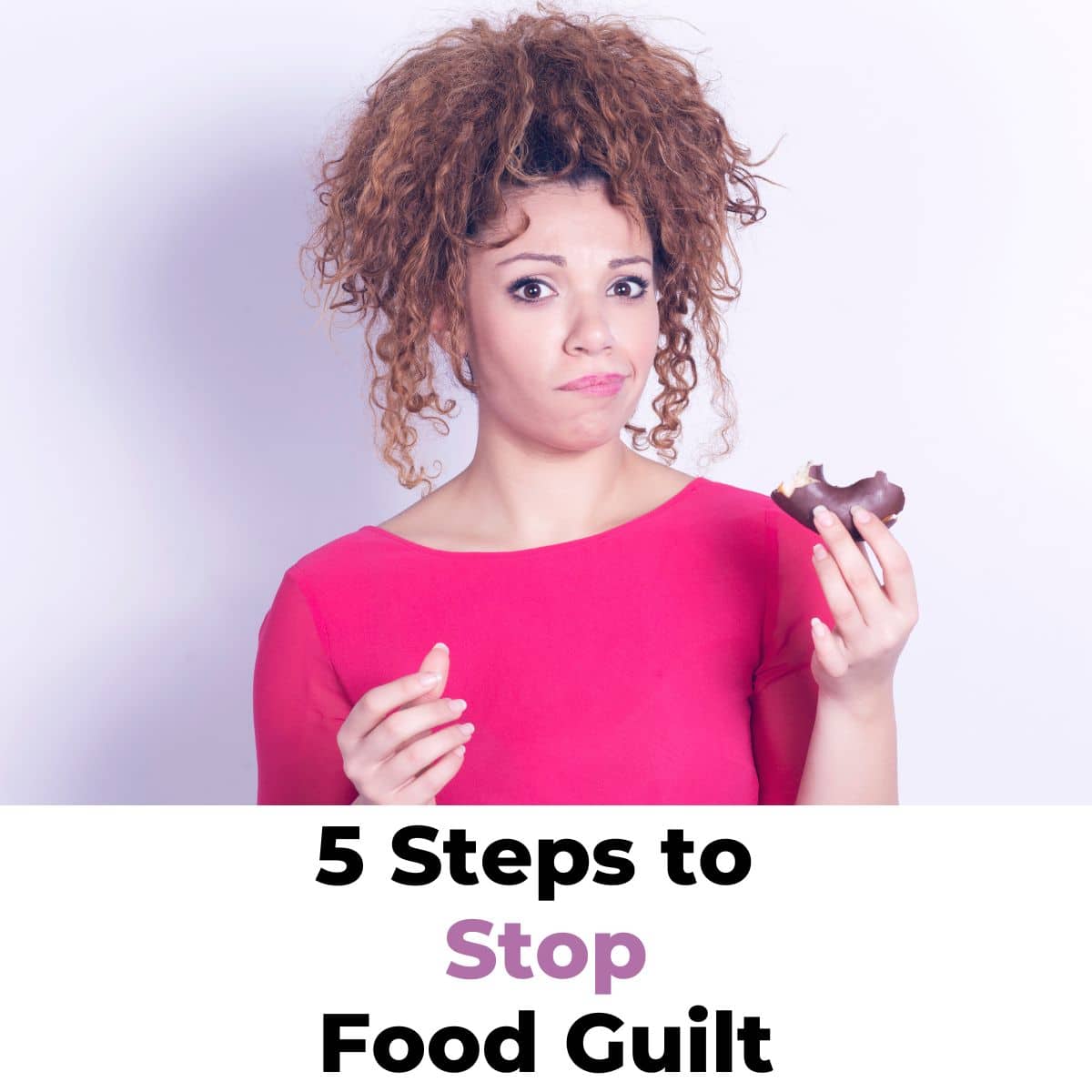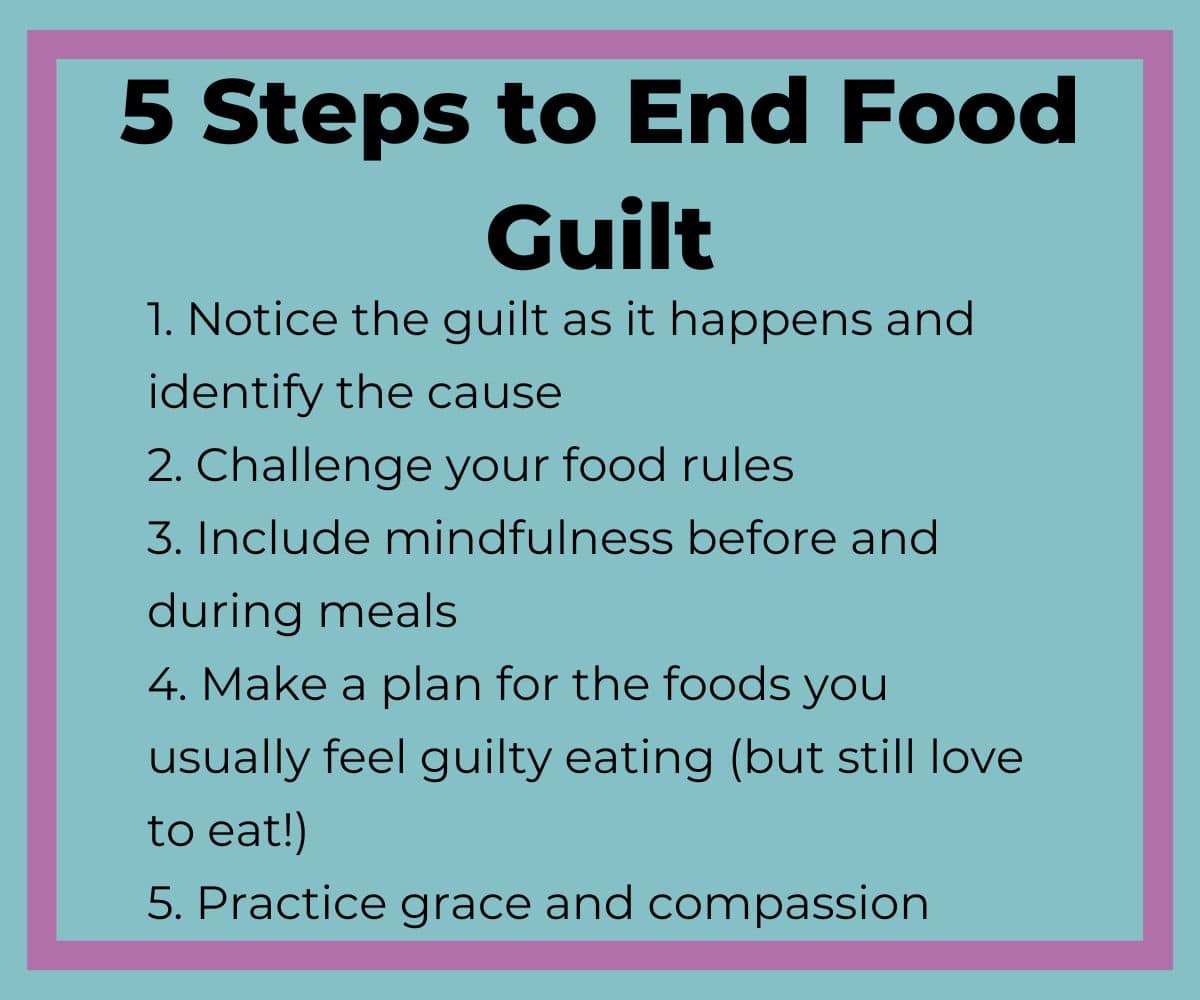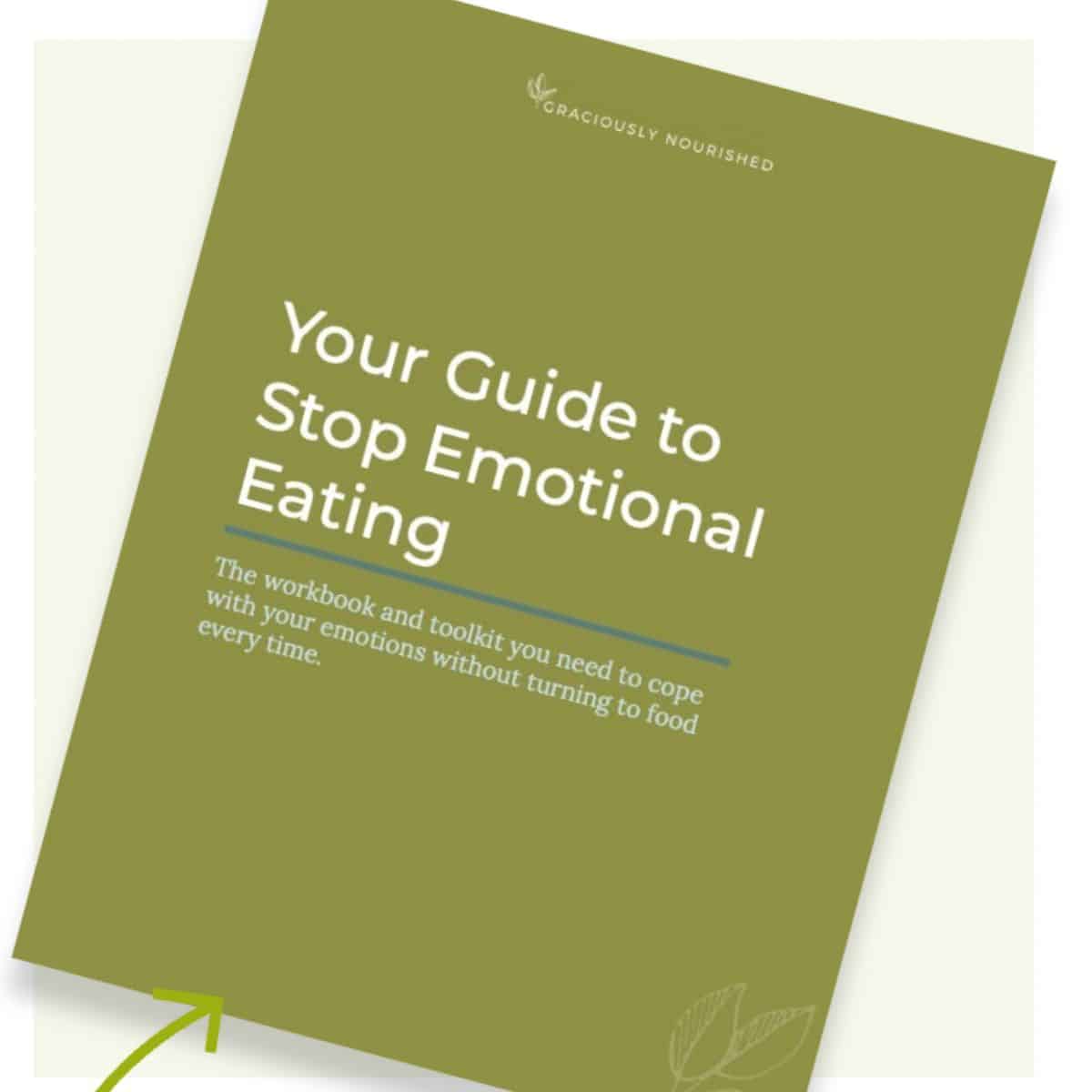Are you always asking yourself, “Why do I feel guilty after eating”? You’re not alone! Here are 5 tips to stop feeling guilty after eating.

Are you always asking yourself, “Why do I feel guilty after eating?”. You’re definitely not alone! Food guilt is super common and a direct result of our diet-obsessed society. When food is viewed as “good” and “bad” everywhere, from the break room at work to social media and everywhere in between, it’s hard to not feel guilty after eating sweets or other “unhealthy” food.
Food guilt can lead to feelings of hopelessness and a loss of control, which has a major negative effect on mental well-being and even start to affect your physical health.
It’s important to know what food guilt is and why it happens. Then we’ll dive into how stopping the food guilt can improve your health, plus my top tips to get you started.
Ready to stop feeling guilty about what you eat? Keep reading!
** Please note that this is not medical advice, only suggestions on how to approach eating without guilt, and is not a substitute for an eating disorder treatment plan. If you have an eating disorder or suspect an eating disorder, seek advice from your doctor and medical team!
Jump to:
What is food guilt?
Guilt is a “feeling of worry or unhappiness that you have because you have done something wrong.” It doesn’t really sound like this feeling should have anything to do with a substance that is essential to our survival, but for so many of us, it absolutely does!
Food guilt can feel like regret, remorse, or shame after eating. You could experience it after eating sweets, snack foods, fast food, soda, or after eating what you feel is “too much” food.
You may think that it’s good to feel this way! Feeling bad about eating “bad” foods must make it easier and more likely that you’ll stop eating them altogether, right?! While this thought process makes sense, it couldn’t be further from the truth.
Research has found that connecting guilt and shame to food is actually counterproductive. A study found that those who associated eating chocolate cake with celebration rather than guilt were less likely to overeat and felt less “out of control” around food.
You heard that right. People who ate cake and felt good about the experience felt more in control around food and ate less cake than people who felt guilty for indulging in it.
Why do I feel guilty after eating?
Food guilt often shows up after eating if we’re stuck in the habit of categorizing foods as “good” or “bad”. This black-and-white approach to nutrition by labeling foods as healthy or unhealthy can contribute to feelings of guilt and shame if we eat the “bad” foods and even feelings of superiority or pride when we pick the “good” choices.
Think about the last time you were on a diet and made all the “right” choices. You stuck to your calorie limit, ate the right foods, and chose the healthy option over the one you truly wanted. You may have felt really good about yourself like you could do anything!
Then how did you feel when you made the “wrong” choice or fell off of your diet? I’m guessing pretty awful. When you assign moral value to your food selections, kicking food guilt can be tough to do.
If you’re not sure where these feelings stem from or if they’re the result of past trauma, you may want to work with a non-diet nutrition professional or therapist to help you untangle your thoughts, feelings, and beliefs around food.
How ending food guilt will improve your health
Did you know that food guilt can actually harm your physical health, too? Feeling guilty about food can increase stress, contribute to the diet-binge cycle and even impact our social lives. Here’s how it works.
Food guilt increases stress
Worrying and stressing over the food you eat does more than just take up brain space. It actually creates a hormonal cascade that can create a number of problems.
When you’re worried or feeling anxious, your cortisol levels rise. Although it is normal to have some stress, constant stress and, therefore, constantly high cortisol levels can have a long-term impact on your health.
Chronically raised cortisol levels are linked to an increased risk of stroke, hypertension, and heart attacks, raised inflammation levels, headaches, fatigue, and digestive problems.
Food guilt is part of the diet-binge cycle
If you feel guilty after eating a certain food, your initial reaction could be to diet or restrict food to “make up” for what you feel bad about eating. You eat, feel bad, restrict, get overly hungry, or start craving said food, eat it again and repeat the same pattern over and over.
Even if you say, “But, I never go on a diet,” you could be restricting food or holding on tightly to your food rules, which essentially has the same effect.
Breaking the diet-binge cycle will lead to food freedom, less stress or anxiety about food, give you more energy and allow you actually to enjoy food and the experiences surrounding food.
Food guilt can impact your social life
If you know a social event is going to revolve around certain fear foods that bring up feelings of guilt or shame, you could find yourself skipping the party to avoid the upcoming guilt-fest.
Removing guilt from eating is essential to having a strong social life and social connection. Just think about how many gatherings include delicious food! The health benefits of experiencing strong relationships and engaging in fulfilling social events cannot be understated. This connection is a major determinant of health and can reduce the risk of physical and mental disorders.
Truly enjoying what you’re eating allows you to be present with the people around you and stay in the moment, strengthening relationships and bringing more joy into your life!
5 steps to stop feeling guilty after eating
Even if it feels impossible now, you can overcome food guilt and have a more positive relationship with food. Be patient with yourself as you work through your food guilt and start enjoying food again. It takes time and consistent practice, but the work is so worth the freedom and joy (and delicious food) it brings!
Here are my top 5 steps to get you started.

1. Notice the guilt as it happens and identify the cause
Feelings of food guilt may be heightened by certain foods or situations. The first step to stopping food guilt is to recognize the guilt as it happens.
Society has conditioned us to feel bad when we eat foods that are stereotypically considered “unhealthy,” “junk,” or “indulgent.” You may be able to logically comprehend that a few cookies won’t have any significant effect on your health or your weight, but the feelings that come up after eating certain foods say something different.
Slow down, notice the guilt, and try to identify any triggers that have led to these feelings. What is it about this food that makes you feel guilty? Is it just this food? Others too? What do you fear will happen by eating this food? And if that fear comes true, what’s the worst that could actually happen?
2. Challenge your food rules
Even if you’re not following a “diet”, you likely have food rules in place that tell you when you’re doing something good or bad when it comes to eating. Most food rules have been picked up throughout life from friends, family, magazines, social media, and a number of other places.
What was once a passing comment or “fact” you read becomes a fixture in your life about how you view food and what you see as good or bad when it comes to eating.
Once you can identify your food rules, start challenging them. Where did they come from, and when did you start following it? Is there science to back this up, or is it just a diet fad? What will truly happen if you decide to stop following your food rule?
It can be scary to challenge yourself, break your food rules, and consciously eat (and enjoy) off-limit foods. Taking food off the moral pedestal starts with giving yourself unconditional permission to eat all foods.
3. Include mindfulness before and during meals
It can be helpful to remove distractions while eating (yes, even TikTok!) as well as checking in regularly throughout your meal and snack to get in touch with your hunger and fullness levels.
Allowing yourself to pay attention to how the food you’re eating tastes and feels in your body will increase satisfaction from eating, helping you to truly enjoy the food.
If overeating leads to feeling food guilt, practicing mindful eating can make a big difference in feeling your best after eating. Listening to your body's cues and recognizing signs of hunger and fullness reduces the likelihood of eating past fullness.
If you have a difficult time tuning into your hunger and fullness, look over the intuitive eating hunger scale to get started so you can easily identify the point where you’re satisfied and satiated when eating.
4. Make a plan for the foods you usually feel guilty eating (but still love to eat!)
Challenging your food rules can feel overwhelming. Instead of jumping in as a free for all, it could feel better to make a plan and gradually make peace with food.
When planning to eat the foods you usually feel guilty eating, choose a place and a time you feel calm and comfortable. Make sure you’re not ravenously hungry before sitting down to eat, and allow yourself to eat it slowly, enjoying the flavors, smells, and feel of the food.
Eat as much as you need to be satisfied, checking in with your fullness levels along the way. Doing this regularly, one food at a time, can help you to feel more comfortable eating the foods you’d usually feel bad about eating.
You may even find that you don’t like some foods as much as you thought you did or that you’re able to be satisfied after a much smaller portion of others. When you know you can eat any food whenever you want to, without rules, it’s easier to eat the right amount only when you truly want it.
5. Practice grace and compassion
When challenging yourself with food, approach the experience with curiosity, not judgment. Curiosity allows you to make space for reflection and understanding without shame.
Remember, undoing the years of diet culture’s influence on food, movement, and your body takes time. Be kind to yourself!
Looking for more support?
If you often find yourself feeling guilty after eating for reasons other than physical hunger, grab my free emotional eating toolkit and workbook to help you cope with your emotions without turning to food every time (and learn healthier ways to use food to improve your mood!).

The bottom line: Why do I feel guilty after eating?
There are many reasons why you may feel guilty after eating, including labeling foods as “good” and “bad”, as well as the influence of others, including friends, family, and social media.
Learning to break away from food guilt and finding food freedom takes time. But regardless of how long it takes, the results of being able to eat without guilt, truly take care of your body, and enjoy food is worth it!

Laura says
I do have disordered eating and I throw up (too easily). I have a lot of insight into a 30 year problem. I know what I need to do! Emotions around food get in the way. I feel in control when I don't eat but at the same time I want to feel well. I have just given up alcohol but my appetite is non existent. So I'm just nibbling on foods I like. I am getting support from TalkED next week.
Kelsey Kunik, RDN says
I'm glad you found this as a resource! For anyone struggling with an eating disorder, I highly recommend working with a therapist and dietitian who specializes in eating disorders. The information on my website is general and not meant to replace individualized therapy.